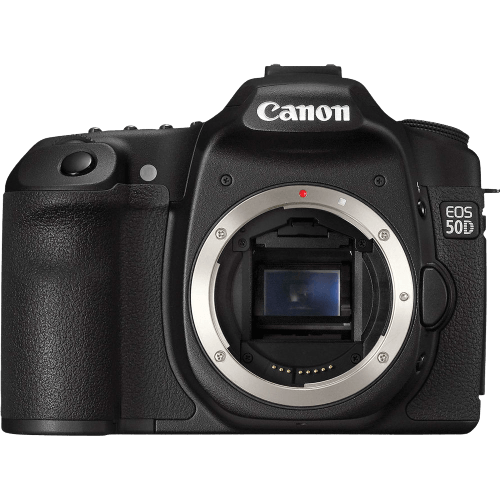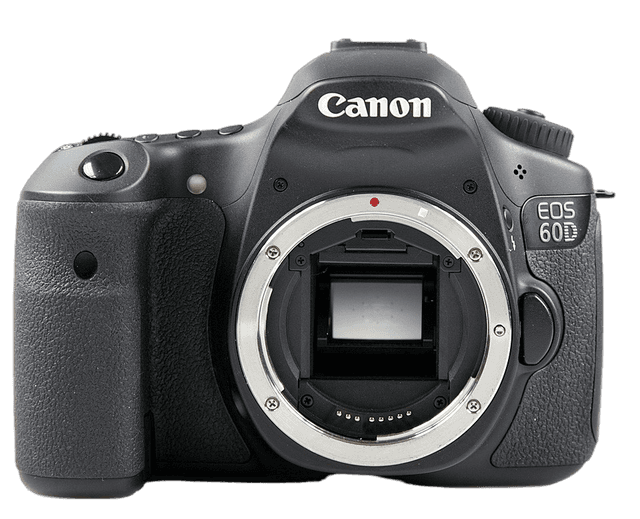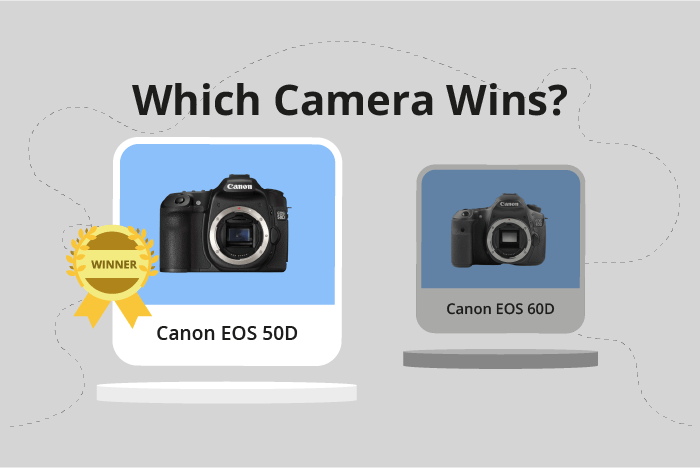Canon EOS 50D vs EOS 60D Comparison
Canon EOS 50D

Canon EOS 60D

The Canon EOS 50D narrowly edges out the EOS 60D with a score of 48/100 compared to the 60D’s 47/100. Both DSLR cameras share similarities in their specifications. They both were announced in August (50D in 2008 and 60D in 2010) and have similar sizes, with the 50D measuring 146 x 108 x 74mm and the 60D at 145 x 106 x 79mm.
The EOS 50D outperforms the 60D with a slightly higher score, but the EOS 60D has its advantages, such as a lower launch price of $1199 compared to the 50D’s $1300, and a lighter weight of 755g (1.66lbs) compared to the 50D’s 822g (1.81lbs).
Taking into account these specifications, the Canon EOS 50D has a slight edge over the EOS 60D, but the 60D offers more value for money and is lighter, making it a better choice for some users.
Canon EOS 50D vs EOS 60D Overview and Optics
The Canon EOS 50D wins the optics comparison with a score of 47/100, while the Canon EOS 60D scores 43/100. Both cameras share several specifications, such as the CMOS sensor type, Digic 4 processor, APS-C sensor size, Canon EF-S lens mount, and the absence of image stabilization. Despite these similarities, there are differences that set these cameras apart.
The Canon EOS 50D has a shooting speed of 6.3 frames per second, which is faster than the Canon EOS 60D’s 5.3 frames per second. This advantage allows the 50D to capture fast-moving subjects more effectively and makes it a better choice for action photography. However, the Canon EOS 60D boasts a higher megapixel count at 18, compared to the 50D’s 15.1 megapixels. This difference enables the 60D to produce higher resolution images, which is beneficial for photographers who prioritize detail and image quality.
The Canon EOS 60D has a slightly better DXOMARK sensor score of 66, compared to the 50D’s score of 63. This higher score means that the 60D’s sensor performs better in terms of dynamic range, color depth, and low-light performance. However, the 50D’s faster shooting speed may outweigh the 60D’s slightly better sensor performance for some photographers.
Weighing the advantages and disadvantages of both cameras, the Canon EOS 50D emerges as the winner in the optics comparison due to its faster shooting speed, which is essential for capturing fast-moving subjects. The Canon EOS 60D, on the other hand, offers higher resolution images and a slightly better sensor performance, making it a suitable choice for photographers who prioritize image quality and detail. Ultimately, the choice between these two cameras depends on the specific needs and preferences of the photographer.
Canon EOS 50D vs EOS 60D Video Performance
When it comes to video capabilities, the Canon EOS 50D unfortunately does not offer any video functionality. This means that users looking for a camera with video recording options will need to consider other models. On the other hand, the Canon EOS 60D does provide video capabilities, which we will now explore.
The Canon EOS 60D has a video score of 43 out of 100, which provides a basic understanding of its video performance. The camera offers Full HD video recording with a maximum resolution of 1920 x 1080 pixels. This ensures that users can capture high-quality videos with this camera. Additionally, the EOS 60D supports a maximum video frame rate of 30fps, which enables smooth video playback.
However, it is important to note that the Canon EOS 60D does not have built-in time-lapse functionality. This may be a drawback for some users who are interested in capturing time-lapse videos without the need for additional software or equipment.
Taking into account the video capabilities of both cameras, it is clear that the Canon EOS 60D is the better choice for those who require video functionality in their camera. While the Canon EOS 50D lacks video capabilities entirely, the EOS 60D offers Full HD video recording and a decent frame rate, making it suitable for users who need a camera with video options.
Canon EOS 50D vs EOS 60D Features and Benefits
The Canon EOS 60D stands as the winner with a feature score of 57/100, slightly ahead of the Canon EOS 50D, which scores 54/100. Both cameras share some specifications, such as a 3-inch screen size, lack of touchscreen, GPS, WIFI, and Bluetooth.
The EOS 60D outperforms the EOS 50D in terms of screen resolution, offering 1,040,000 dots compared to the 50D’s 920,000 dots. This difference results in a sharper and more detailed display on the 60D. Additionally, the 60D features a flip screen, allowing greater flexibility in capturing images from various angles and aiding in self-portraits. This flip screen is absent in the EOS 50D.
On the other hand, the EOS 50D does not surpass the 60D in any specific feature, as they share most of their specifications. However, the 50D’s slightly lower score does not necessarily imply that it is an inferior camera. It may still be a suitable choice for specific users, depending on their preferences and requirements.
After comparing the features of the Canon EOS 50D and EOS 60D, it is evident that the 60D offers advantages in screen resolution and the presence of a flip screen. These enhancements contribute to its higher score and make it a more versatile camera. While the 50D does not surpass the 60D in any particular aspect, it remains a viable option for those who do not prioritize the benefits provided by the 60D. Ultimately, the choice between these two cameras will depend on the individual needs and preferences of the user.
Canon EOS 50D vs EOS 60D Storage and Battery
The Canon EOS 60D outperforms the Canon EOS 50D in storage and battery with a score of 45/100, compared to the 50D’s 35/100. Both cameras have a single memory card slot, but the 60D accepts SD, SDHC, and SDXC cards, while the 50D only supports Compact Flash (Type I or II) and UDMA cards. The 60D’s broader range of memory card compatibility gives it an advantage.
In terms of battery life, the Canon EOS 60D lasts for 1100 shots with its LP-E6 battery, whereas the Canon EOS 50D has a shorter battery life of 800 shots using the BP-511A battery. Neither camera offers USB charging. The 60D’s longer battery life is a clear advantage, allowing users to take more photos before needing to replace or recharge the battery.
Although the Canon EOS 50D has a lower storage and battery score, it does not have any specific advantages in these areas over the 60D. The 60D’s wider memory card compatibility and longer battery life make it the better choice when considering storage and battery capabilities.
Canon EOS 50D vs EOS 60D – Our Verdict
Are you still undecided about which camera is right for you? Have a look at these popular comparisons that feature the Canon EOS 50D or the Canon EOS 60D:

